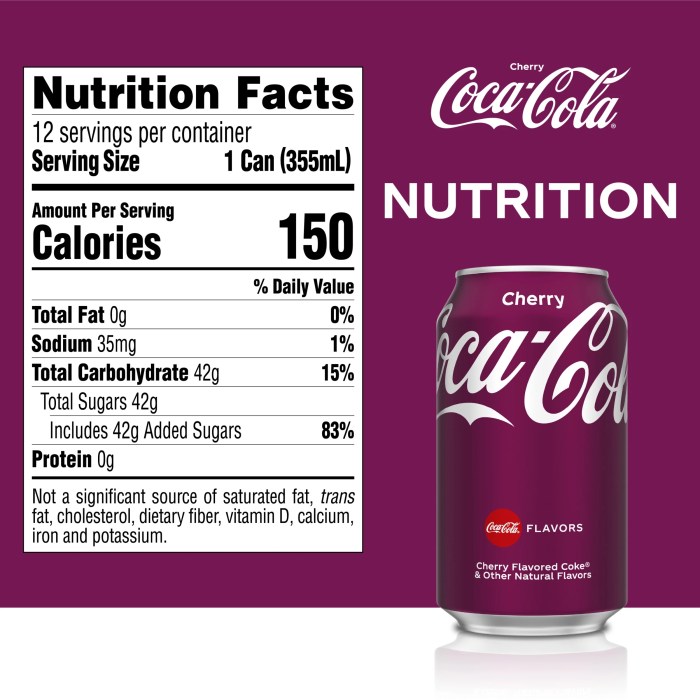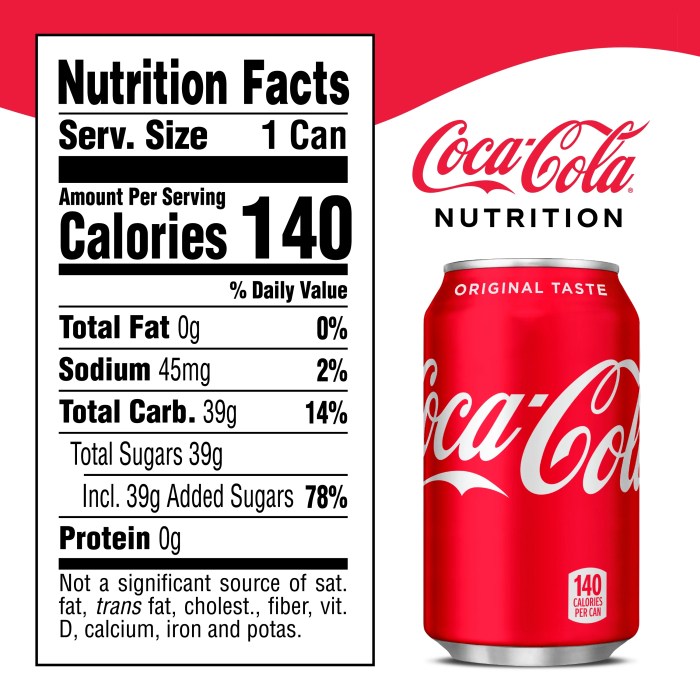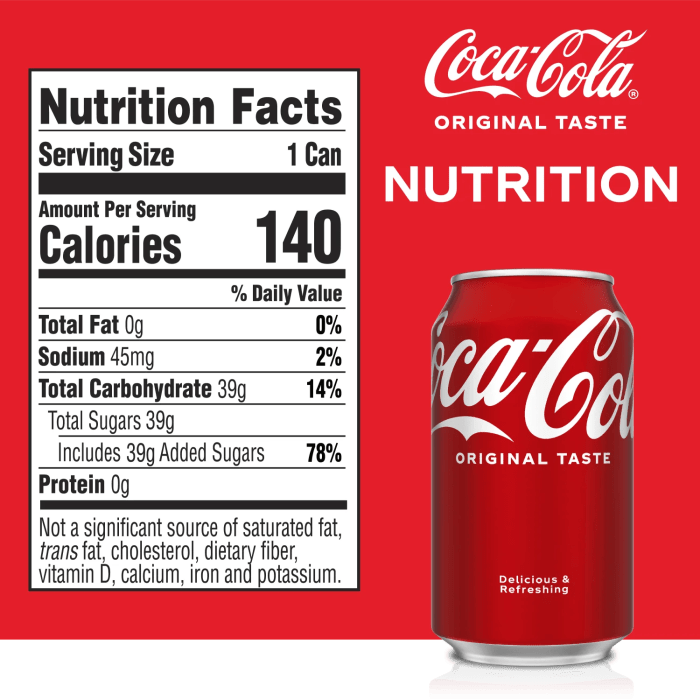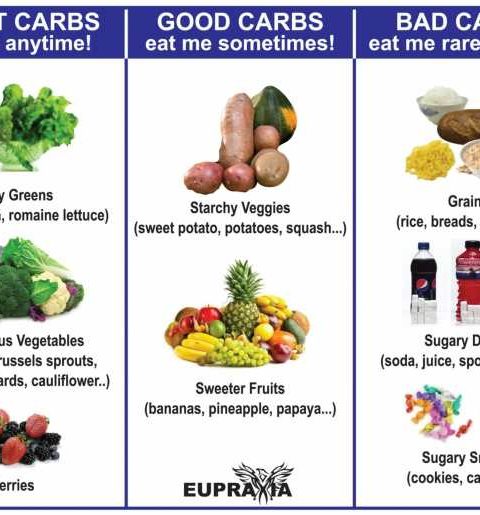Nutritional Content Breakdown

12 oz coke nutrition facts – Understanding the nutritional content of a 12-ounce can of Coca-Cola is crucial for making informed choices about your beverage consumption. This section provides a detailed breakdown of its components and compares it to similar soft drinks, highlighting the impact of its sugar content on daily intake.
Coca-Cola Nutritional Information
The following table details the nutritional information for a 12-ounce (355ml) can of Coca-Cola, based on data from the Coca-Cola website. Note that nutritional values may slightly vary depending on the source.
| Serving Size | Nutrient | Amount per Serving | % Daily Value |
|---|---|---|---|
| 12 fl oz (355ml) | Calories | 140 | 7% |
| 12 fl oz (355ml) | Total Fat | 0g | 0% |
| 12 fl oz (355ml) | Cholesterol | 0mg | 0% |
| 12 fl oz (355ml) | Sodium | 0mg | 0% |
| 12 fl oz (355ml) | Total Carbohydrate | 39g | 13% |
| 12 fl oz (355ml) | Sugars | 39g | – |
| 12 fl oz (355ml) | Protein | 0g | 0% |
| 12 fl oz (355ml) | Vitamin D | 0mcg | 0% |
| 12 fl oz (355ml) | Calcium | 0mg | 0% |
| 12 fl oz (355ml) | Iron | 0mg | 0% |
| 12 fl oz (355ml) | Potassium | 0mg | 0% |
Comparison with Other Carbonated Soft Drinks
A 12-ounce serving of Coca-Cola’s nutritional profile is comparable to other carbonated soft drinks. However, specific values can vary slightly depending on the brand and specific formulation.
The following is a general comparison, and precise figures should be checked on individual product labels:
- Pepsi: Generally contains a similar amount of calories, sugars, and carbohydrates to Coca-Cola.
- Dr. Pepper: Often contains slightly more calories and sugar than Coca-Cola due to its complex flavor profile.
- 7 Up/Sprite: These lemon-lime sodas typically contain fewer calories and sugars than Coca-Cola, as they often use alternative sweeteners.
- Diet Sodas: These versions of the above typically have significantly fewer calories and sugars, often using artificial sweeteners instead of sugar.
Impact of Sugar Content on Daily Intake
A 12-ounce can of Coca-Cola contains 39 grams of sugar. The American Heart Association (AHA) recommends a maximum of 25 grams of added sugar per day for women and 36 grams for men. Therefore, consuming a single 12-ounce Coke can easily exceed the recommended daily added sugar intake for many individuals, particularly women. Regular consumption of such high-sugar drinks can contribute to weight gain, increased risk of type 2 diabetes, and other health problems.
It is important to consider this sugar content in relation to overall daily dietary intake and to choose beverages in moderation.
Ingredients and Additives

Coca-Cola’s ingredient list, while seemingly simple, reveals a complex interplay of substances contributing to its characteristic taste and preservation. Understanding these components, both natural and artificial, is crucial for informed consumption.
A 12-ounce can of Coca-Cola typically contains carbonated water, high fructose corn syrup, caramel color, phosphoric acid, caffeine, natural flavors, and aspartame (in some variations). Carbonated water provides the fizz. High fructose corn syrup is the primary sweetener, offering a balance of sweetness and cost-effectiveness. Caramel color imparts the iconic dark brown hue. Phosphoric acid contributes to the tartness and acts as a preservative.
Caffeine provides the stimulating effect. Natural flavors are a blend of undisclosed compounds contributing to the complex taste profile. Aspartame, when present, serves as an artificial sweetener, although it is not always included in all Coca-Cola products. The exact proportions of these ingredients are proprietary information.
Understanding the nutritional content of a 12 oz Coke is crucial for mindful eating. For a contrasting perspective on fast-food nutrition, you might want to check out the comprehensive nutritional information available at nutrition facts jimmy johns , which offers a detailed breakdown of their menu items. Returning to the 12 oz Coke, remember that its high sugar content should be considered within your overall daily intake.
Potential Health Effects of Artificial Sweeteners and Preservatives
The use of artificial sweeteners and preservatives in Coca-Cola, particularly high fructose corn syrup and potentially aspartame, raises concerns about potential health effects. While more research is needed to definitively establish long-term impacts, some potential short-term and long-term effects are noteworthy.
It is important to note that the research on the long-term effects of these additives is ongoing and the results are often debated among scientists. The effects can also vary significantly depending on individual factors like overall diet, genetics, and pre-existing health conditions.
- Short-term effects: Some individuals report experiencing digestive issues such as bloating or gas after consuming beverages sweetened with high fructose corn syrup. Aspartame, in sensitive individuals, may cause headaches or other neurological symptoms. The high sugar content of Coca-Cola can lead to a temporary energy spike followed by a crash.
- Long-term effects: High consumption of high fructose corn syrup has been linked to an increased risk of weight gain, type 2 diabetes, and metabolic syndrome. Some studies suggest a possible link between artificial sweeteners and an increased risk of certain cancers, though the evidence is not conclusive. Regular consumption of highly acidic beverages like Coca-Cola can contribute to tooth enamel erosion.
Comparison of Coca-Cola Ingredients to a Naturally Sweetened Beverage
To illustrate the differences, let’s compare the ingredient list of Coca-Cola to a hypothetical naturally sweetened beverage, such as a homemade sparkling fruit juice.
Imagine a visual representation: On one side, a list shows the numerous ingredients of Coca-Cola: carbonated water, high fructose corn syrup, caramel color, phosphoric acid, caffeine, natural flavors, and possibly aspartame. On the other side, a much shorter list represents the natural beverage: filtered water, fruit juice (e.g., orange, apple), and possibly a touch of lemon juice for tartness.
The visual contrast highlights the simplicity of the natural option compared to the complexity of the processed beverage. This comparison emphasizes the differences in processing, additives, and potential health implications.
Health Implications and Considerations

Regular consumption of Coca-Cola, like other sugar-sweetened beverages, is linked to several adverse health effects. Understanding these risks is crucial for making informed choices about beverage intake and maintaining overall well-being. This section will explore the potential health implications associated with daily consumption of a 12-ounce Coca-Cola, focusing on weight management, dental health, and cardiovascular health. We will also offer practical recommendations for reducing or eliminating Coca-Cola from your diet and provide a comparison with healthier alternatives.
Weight Gain
The high sugar content in Coca-Cola contributes significantly to weight gain. A 12-ounce can contains approximately 39 grams of sugar, which translates to a substantial amount of empty calories – calories that provide little to no nutritional value. These excess calories are readily stored as fat, leading to weight gain and an increased risk of obesity. Studies have consistently demonstrated a correlation between the consumption of sugar-sweetened beverages and increased body weight and obesity rates.
For example, a longitudinal study published in theAmerican Journal of Clinical Nutrition* showed a significant positive association between sugary drink intake and weight gain in children and adolescents. The excess sugar also contributes to increased appetite, further exacerbating weight gain.
Dental Health
The high sugar content in Coca-Cola creates an acidic environment in the mouth, which erodes tooth enamel. The bacteria in plaque feed on the sugar, producing acids that attack the enamel, leading to cavities and tooth decay. The dark color of Coca-Cola can also stain teeth over time. Regular consumption of Coca-Cola significantly increases the risk of dental problems, requiring more frequent dental visits and potentially more extensive dental procedures.
Good oral hygiene practices, such as brushing and flossing, are important but may not fully mitigate the negative impact of regular Coca-Cola consumption.
Cardiovascular Health
Excessive consumption of sugar-sweetened beverages, including Coca-Cola, is linked to an increased risk of cardiovascular diseases. High sugar intake can contribute to high blood pressure, high cholesterol, and insulin resistance, all major risk factors for heart disease and stroke. Studies have shown a correlation between regular consumption of sugary drinks and an increased risk of developing type 2 diabetes, a condition closely associated with cardiovascular complications.
The added sugars in Coca-Cola contribute to inflammation in the body, which further increases the risk of cardiovascular problems.
Recommendations for Reducing or Eliminating Coca-Cola Consumption
Gradually reducing or eliminating Coca-Cola from your diet can significantly improve your overall health. Start by substituting Coca-Cola with healthier alternatives like water, unsweetened tea, or sparkling water with a squeeze of lemon or lime. Pay attention to your cravings and find healthier ways to satisfy them, such as opting for fruit or vegetables. Reading food labels and being mindful of added sugar in other foods and drinks is also crucial.
Seeking support from a registered dietitian or healthcare professional can provide personalized guidance and support for making sustainable dietary changes.
Comparison of Health Implications, 12 oz coke nutrition facts
| Factor | 12 oz Coca-Cola Daily | Water/Unsweetened Tea Daily |
|---|---|---|
| Weight Gain | High risk due to high sugar and empty calories | Low risk; contributes to hydration and satiety |
| Dental Health | High risk of cavities and enamel erosion | Low risk; promotes oral health |
| Cardiovascular Health | Increased risk of high blood pressure, high cholesterol, and type 2 diabetes | Low risk; contributes to overall cardiovascular health |
| Nutrient Content | Minimal nutritional value; high in sugar | Provides essential hydration and potential antioxidants (tea) |
Essential FAQs: 12 Oz Coke Nutrition Facts
What are the main health concerns associated with consuming too much Coke?
Excessive Coke consumption is linked to weight gain, type 2 diabetes, tooth decay, and cardiovascular issues due to its high sugar and calorie content.
Does diet Coke offer a healthier alternative?
While diet Coke eliminates sugar, it contains artificial sweeteners which have their own potential long-term health implications that are still under research. It’s not necessarily a significantly healthier option.
How many calories are in a 24-ounce Coke?
A 24-ounce Coke typically contains double the calories of a 12-ounce serving; approximately 240 calories.
Are there any natural alternatives to Coca-Cola?
Yes, many healthier alternatives exist, including water, unsweetened tea, sparkling water with fruit slices, and diluted fruit juices.
What is the recommended daily sugar intake?
The recommended daily added sugar intake varies depending on age, sex, and activity level, but generally, it’s advisable to keep added sugar consumption low.





